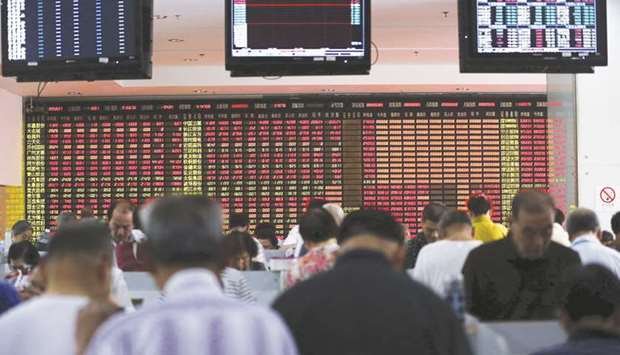The $2.6bn Trilogy Global Advisors Emerging Wealth Fund had almost 10% of its assets in just two stocks at the end of last year – Baidu, China’s biggest search-engine provider, and Alibaba Group Holding, an e-commerce titan. Co-managers Tom Masi and Nuno Fernandes say the companies are poised to enter new business arenas that will boost revenue with relatively low costs to acquire new customers.
On a broader basis, they’re expecting developing-nation equities to outperform their developed peers for the third consecutive year in 2018, betting that faster earnings growth will continue to support valuations. Their strategies helped generate the best return last year among 653 actively-managed emerging-market funds with at least $500mn in assets, according to data compiled by Bloomberg.
“We started to see this big overall shift,” Masi said in an interview from New York. “Earnings growth in emerging markets on a trailing 12-month basis started to really exceed that of developed. That trend continues.”
At the end of last year, the Trilogy fund’s holdings in Baidu and Alibaba were almost double the weighting in the benchmark MSCI Emerging Markets Index. Naspers, Sands China Ltd and Sberbank of Russia rounded out the top five holdings. Geographically, the fund was slightly overweight in India and had less exposure than the benchmark to South Korea, Taiwan and Brazil.
Here’s what the fund managers had to say about their outlook for emerging markets:
What’s your bird’s eye view of the market right now?
Tom Masi: There’s an underlying dynamic shift in emerging countries towards consumption. Those companies and franchises in emerging that are more geared toward consumption are basically starting to show growth and starting to shine through. We saw more evidence of the shift to consumption in both China and India, and we saw some of the Latin American countries and also Russia starting to fall behind. The valuation relative to developed-market companies is still below-average on a trailing 12-month basis. They’re still cheap.
A lot of your allocation is in China. Are you sticking with it?
Tom Masi: We’re excited about Alibaba and Baidu. We’ve done a lot of work on digital payments, and mobile payments and as a result we’ve compared Amazon’s competitive landscape with Alibaba’s competitive landscape. We’ve realised that there are components of Alibaba like AliPay that doesn’t exist in an Amazon and there’s no franchise like that in the US.
Nuno Fernandes: The ecosystems that Tencent and Alibaba have created, you don’t have anything like it here. Basically, those 500-plus million consumers that each of them have, the acquisition cost for those customers for any product they roll out is basically zero. So when they decide to launch mutual funds and brokerage accounts, they go from zero to 2mn in two years. When they start lending money to consumers, they go from zero to 120mn in three years. This is at zero cost because the customers are constantly in their ecosystems.
What opportunities do you see in the rest of the world?
Nuno Fernandes: In Mexico, we have an opportunity to buy franchises that are really well-run, like Kimberly-Clark, Gruma and Banorte, at a reasonable price. Brazil is a completely different story. Brazil is in need of serious reform. The deterioration in the social security balance is alarming. It does not look like the current administration is able to pass anything that’s really aggressive. They’re pushing the can to the next administration, and it’s way too early to tell. Until June, we won’t really know with any level of certainty who is going to run the country. Meanwhile, the valuations in Brazil are already pricing in a nice recovery.
What do you expect in terms of volatility this year?
Tom Masi: If you can hold on and ignore volatility, then you’ve got the right-sized exposure, but if you feel uncomfortable, maybe cut it back a little bit and look for an opportunity to increase it.
Historically, the emerging-market experience is that investors come to it after it’s had a good run, they buy it then. Then it goes through a difficult period and they sell it. They never capture the returns over a long period of time. We think this strategy with a focus on quality and liquidity can be one that people can stay with in good times and bad.

